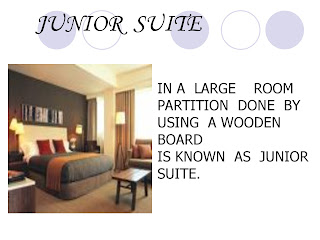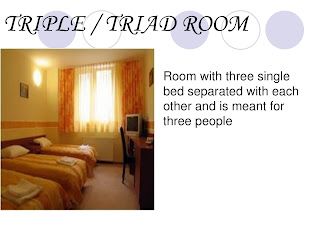Room Type
What is the meaning / definition of
Room Type in the hospitality industry?
In
Hospitality, the days of a hotel only offering guests standard rooms for
reservations are long gone! Nowadays, there are myriad room types and suites at
hotels around the world – a delightfully eclectic selection – meaning that any
size of group and most preferences can be catered for.
Of
course, variously sized and styled room are made available at differing rates,
but prices can be adjusted depending upon occupancy, time of year, and other
factors.
Hotel
Rooms
It is quite strange, that so far
in the hotel industry has not appeared a unified classification system for the
hotel rooms. Of course, today almost any modern hotel has at its disposal
standard rooms and suites. But often the same category of rooms in different
hotels may imply different living conditions.
There are basic classification systems, which are used in some counties mort than one decade. It basically concerns the hotel sector in Western Europe, USA, hotels in Australia, Brazil, Japan and some countries of the Asian region. During recent years, the system of hotel room classification was adopted by numerous residence buildings and hotels in Russia.
The class of the room in the hotel mostly depends on the structure of the hotel itself. The classification of the hotel rooms is often used not so much for the indication of comfort, as for the reflection of the number of beds. You can safely say that the general standard for the international hotel business today is a single room. Tourist, staying in it, can count on the separate bathroom, wardrobe, TV set. WI-FI connection to the Internet is a default option practically in all the rooms of new hotels.
Depending on the host country and the status of the hotel a standard room can have additional functions and features. For example, in many hotels washstands with the separate faucet for cold and hot water can be found. In Chine the standard set for the bathroom includes a hairbrush, a toothbrush and paste. Thereby the standard set for the bathroom in the world hotel industry includes soap, towels for body and hands and, of late, a shower gel.
In addition to the standard room, the world classification distinguishes more than 30 different types of rooms. The type of the hotel room can depend on the view from the window, the number and the size of rooms, the quality of furniture, the content of mini-bar and the availability of office equipment. In addition to the classification of rooms there is a classification of accommodation. There are also a lot of options: from a double room, where three or more people can stay, to accommodation with children or in the separate cabin on the territory of the hotel. Both the room types and the accommodation types have alphabetic acronyms, primarily in English. For example, BO stands for bed only and means that meals are not included. An abbreviation SV (sea view) in the description of the room means that you will be able to observe the sea through your window.
Rooms tend to fall into categories when it comes to price-bands, the type of décor, whether a room is pool-side or ocean-side... Images and descriptions of main features and amenities applying to each room category will usually be included on a hotel’s brand website and across its distribution channels.
Even
though rooms may vary hotel by hotel, the following room-type definitions are
common:
Single room: A single rooms has
one single bed for single occupancy. The size of the bed is normally 3 feet by
6feet.
Twin Room: A twin room has two
single beds for double occupancy.
Double Room: A double room has
one double bed for double occupancy. The size of double bed is 4.5feet to 6
feet.
Triple: A triple room has three
separate single beds and can be occupied by three guests. This type of room is
suitable for groups and delegates of meeting and conferences.
Quad: A quad room has four
separate single beds and can accommodate four persons together in the same
room.
Hollywood Twin Room: It has 2 single beds with
a common headboard. This type of room is generally occupied by two guests.
Double-Double Room: A double
–double room has two double beds and is normally preferred by a family or group
as it can accommodate four persons together.
King Room: A king room has a king
size bed. The size of the bed is 6feet by 6 feet.
Queen room: A queen room has
queen size bed. The size of the bed is 5 feet by 6 feet.
Interconnecting Rooms:
Interconnected rooms have a common wall and a door that connects the two rooms.
This allows guest to access any of the two rooms without passing through a
public area. This type of rooms is a deal for families and crew members.
Adjoining Room: An adjoining room
shares a wall with another hotel room but is not connected by a door.
Adjacent room: An adjacent room is
very close to another room but does not share a common wall with it.
Parlour: A parlour has a living
room without bed and may have sofa and chain for sittings. It is generally not
used as a bedroom.
Studio: A studio has a bed and a
sofa –cum-bed, and is generally used as a living room.
Cabana: A cabana is suited away
from the main hotel building, in the vicinity of a swimming pool or sea beach.
It may or may not have beds and is generally used as a changing room and not as
a bedroom.
Suite: A suite comprise more than
one room, occasionally, it can also be a single large room with clearly defined
sleeping and sitting areas. The decor of such units is of very high standards,
aimed to please the affluent guest who can afford the high tariffs of the room
category.
Duplex: A duplex comprises two
room situated on different floors, which are connected by an internal
staircase. The suite is generally used by business guest who wish to use the
lower level as an office and meeting place and the upper level room as a
bedroom. This type of room is quite expensive.
Efficiency Room: An efficiency
room has an attached kitchenette for guest preferring longer duration of stay.
Generally, this type of room is found in holidays and health resorts where guest
stay for a longer time.
Hospitality Rooms: A hospitality
room is designed for hotel guest who would want to entertain their own guests
outside their allotted rooms. Such rooms are generally charged on hourly basis.
Penthouse: A penthouse is generally located on
the topmost floor of hotel and has an attached open terrace or open sky space.
It has very opulent decor and furnishings, and is among the costliest rooms in
the hotels, preferred by celebrities and major political personalities.
Lanai: A lanai has a veranda or
roofed patio, and is often furnished and used as a living room. It has a view
of garden, sea beach or waterfall.
Murphy Bedded Room: Murphy bedded
room is a room where the bed is hinged at the base of the head board and swing
up into the wall foe storage. During the day room can be used a sitting /living
room and at night the bed can be laid for the guest to sleep
Types of Suites can include:
Master
Suite: A parlour or living room connected to one or more bedrooms.
Mini-Suite
or Junior Suite: A single room with a bed and sitting area. Sometimes the
sleeping area is in a bedroom separate from the parlour or living room.
Also,
it is important to point out that flexible hoteliers will always consider
adding an additional bed (e.g. for a child), where a couple with a toddler wish
to all sleep in the same room, or perhaps for an assigned care-giver. Also, in
some rooms with single or double beds, a couch can be made into an extra bed
where necessary. Finally, we should mention that often double rooms are booked
by individual travellers who perhaps have trouble getting to sleep in a single
bed, and prefer a double bed for their overnight stay or if they are staying
for longer!

















Amazing design.
ReplyDeletePay Stub Generator
Paycheck Stubs
This is really interesting, You’re a highly trained writer. I’ve joined with your feed and furthermore , count on witnessing the very good write-ups. Additionally, I’ve shared your websites with our social networks.
ReplyDeleteluscious South Indian meals
Payroll Codes For Deductions
ReplyDeleteUse an Online Paystub Generator
ReplyDelete7 Reasons Pay Stubs Are Better
ReplyDeletePayroll Record Keeping
ReplyDeleteHow To Obtain Real Paycheck Stubs: A Comprehensive Guide
ReplyDeletePay Stub Generators for Freelancers
ReplyDeleteGuide to Using a Paystub Generator
ReplyDeleteHow to Create Professional Pay Stub in Minutes
ReplyDeleteHotel Suites Orange City Iowa
ReplyDeleteSuite in Orange City Iowa
Excellent service and breathtaking surroundings! The Grand View Resort’s rooms provide a peaceful retreat in Dhanaulti’s lush landscape.
ReplyDeleterooms in dhanaulti
Standard RoomA Standard Room is the perfect blend of comfort and affordability, designed for travelers who value simplicity and convenience. With clean interiors, cozy beds, basic amenities like Wi-Fi, TV, and attached bathrooms, these rooms are ideal for short trips, business travel, or family stays. Affordable yet comfortable, a Standard Room ensures you enjoy a restful stay without overspending.
ReplyDeleteAn wonderful experience! Every visit at the Royal Villa is memorable thanks to its magnificent architecture and stunning surroundings.
ReplyDeleteBest hotels for couples